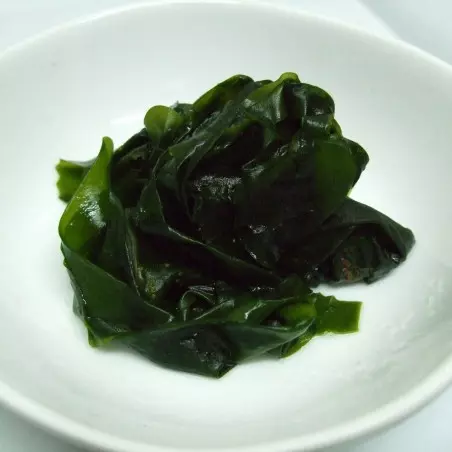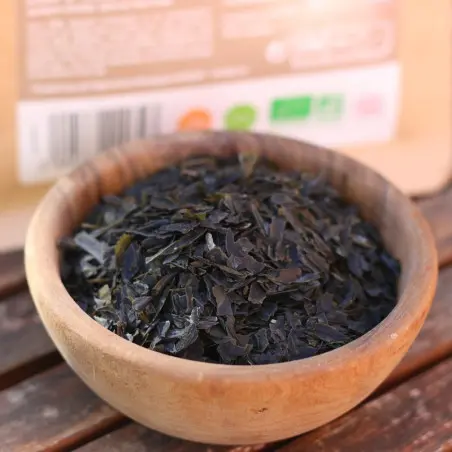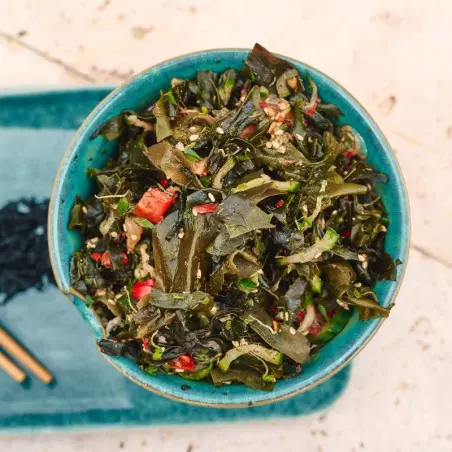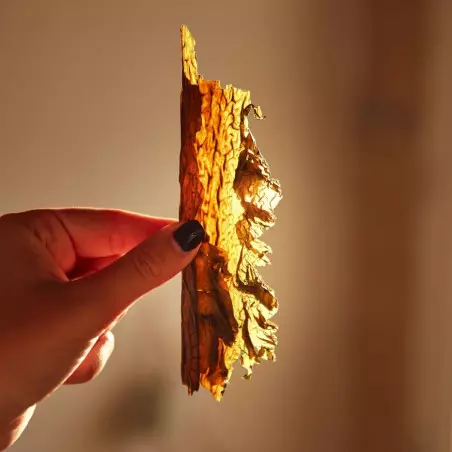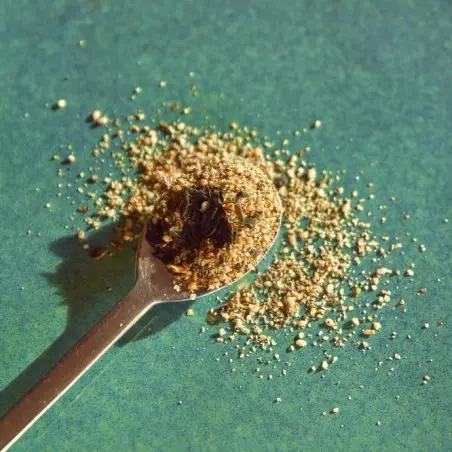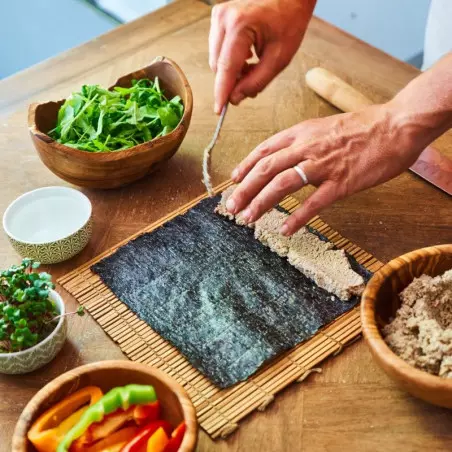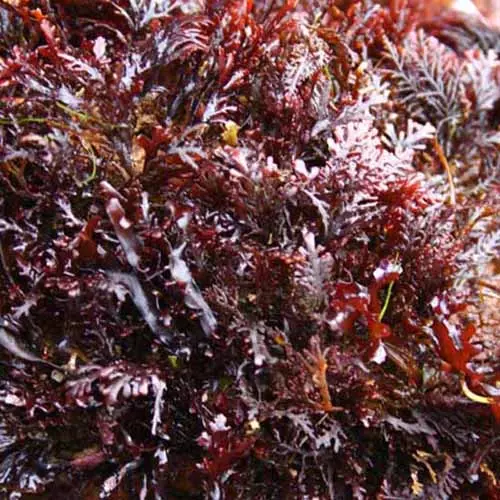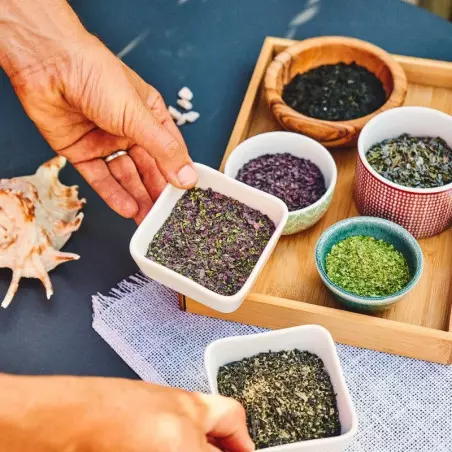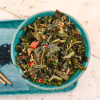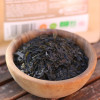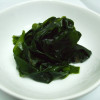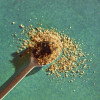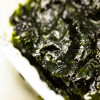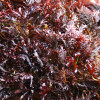Fucoidan, a compound found in certain brown algae, is generating increasing interest in the field of health natural. Discover why this unique polysaccharide could be the key to better health and increased longevity. In this article, we will explore the benefits of fucoidan, its main sources, and how to easily incorporate it into your daily diet.
After reading this article, you will know:
- What fucoidan is and why it is so valuable,
- Which brown algae are the best sources of fucoidan?
- How fucoidan can contribute to your health and longevity,
- Simple ways to incorporate these seaweeds into your diet.
What is fucoidan and why is it so special ?
Fucoidan is a sulfated polysaccharide unique that is mainly found in brown algae such as the Wakame, the Kombu, and other varieties. This natural compound is distinguished by its remarkable biological properties, which generate significant interest in the health field. Present in the cell walls of algae, Fucoidan plays a crucial role in their protection and survival in the marine environment, acting as a natural shield against harsh environmental conditions.
The remarkable properties of fucoidan
Fucoidan is renowned for its Antioxidant activity. It helps to neutralize free radicals, those unstable molecules that can damage cells and contribute to premature aging and various diseases. Thanks to its antioxidant properties, fucoidan plays a key role in cellular protection, thus promoting better health general and increased longevity.
In addition to its ability to combat free radicals, fucoidan is also recognized for its anti-inflammatory effects. Chronic inflammation is linked to many modern diseases, such as heart disease, diabetes, and certain types of cancer. By reducing inflammation, fucoidan may help decrease the risk of these diseases, thereby improving quality of life.
Recent studies have demonstrated the positive impact of fucoidan on human health. For example, a study published in Marine Drugs highlighted the potential of fucoidan to modulate the immune system and offer protection against oxidative stress, which underscores its importance in a healthy and balanced diet. The benefits of fucoidan are not limited to improving cellular health; it is also being studied for its beneficial effects on tissue repair and maintaining the overall balance of the body.
Thanks to these extraordinary properties, fucoidan is increasingly used in dietary supplements and natural health products. It represents a fascinating option for those looking to incorporate natural and effective solutions in their daily diet.
The link with the longevity of Okinawa
The mystery surrounding the longevity of the inhabitants ofOkinawa, a Japanese island famous for its exceptional number of centenarians, has attracted the interest of researchers from around the world. Among the many factors contributing to their longevity, their food plays a crucial role. Indeed, the Okinawans regularly consume brown algae, such as bladderwrack (fucus vesiculosus) and Sea bean, which contain fucoidan.
The algae are an integral part of traditional Okinawan cuisine, not only for their unique taste but also for their nutritional benefits. These edible seaweed are often integrated into salads, of the soups or simply added as a garnish, thus providing a generous dose of fucoidan. This polysaccharide is known for its beneficial properties, including its ability to strengthen the immune system and to combat inflammations thanks to its antioxidant and anti-inflammatory effects.
Studies have shown that fucoidan may contribute to the regulation of blood pressure and cardiovascular health, two essential elements for a long and healthy life. Furthermore, the regular consumption of these algae could help maintain a health peas and to reduce the risks of chronic diseases, benefits that seem to be reflected in the population of Okinawa.
Thus, the example of Okinawa perfectly illustrates how the integration of brown algae rich in fucoidan into our diet could have a profound impact on our health and life expectancy. Adopting certain aspects of this traditional diet can be a path to increased longevity and improved overall well-being.
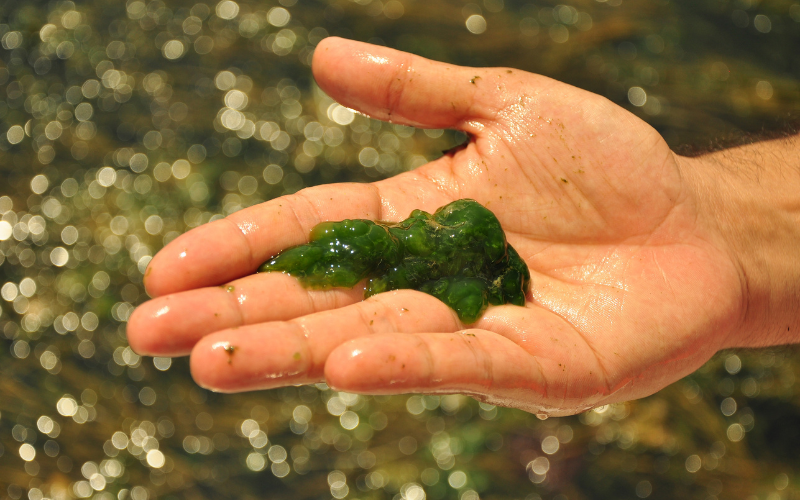
The best sources of fucoidan
Brown algae are treasures of the sea, good sources of fucoidan, a polysaccharide with multiple health benefits. Among these seaweeds, the Wakame, the Kombu, as well as the nori and the dulse, are distinguished by their high content of fucoidan and their nutritional properties unique. Let's discover these exceptional sources together and how to easily integrate them into your daily diet to enjoy their benefits.
Wakame, the star of brown seaweeds
The Wakame, often considered the star of brown algae, captivates with its delicate flavor and impressive nutritional benefits. Native to the Asian coasts, this algae is a central ingredient in many traditional cuisines, particularly in Japanese cuisine, where it is valued for its nutritional benefits and umami taste. Its popularity continues to grow due to its rich nutritional profile and high fucoidan content.
A concentrate of essential nutrients
Wakame is an excellent source of:
- Vitamins A, C, D, E, and K
- Minerals : calcium, magnesium
These nutrients play a key role in maintaining the bone health, the mood regulation, and the immune system support. Moreover, wakame is low in calories, ideal for those who wish to maintain a healthy weight while benefiting from a nutrient-rich diet.
Ease of integration into the diet
Consuming wakame is simple:
- Add it to your salads for a crunchy and nutritious addition.
- Mix it into juices or smoothies for a mineral boost.
- Incorporate it into your raw soups to enhance their taste and nutritional value.
Wakame is often available in dried form and can be quickly rehydrated, making it easy to incorporate into your daily routine.
Cardiovascular health benefits
In addition to its nutritional benefits, wakame is valued for its potential health effects, particularly in terms of managing cholesterol and blood pressure. Studies suggest that the compounds present in wakame, including fucoidan, may help to:
- Protect the heart,
- Improve blood circulation.
Regularly including wakame in your diet could therefore be a delicious and effective strategy for promoting cardiovascular health.
A valuable source for a healthy lifestyle
For those looking to enrich their diet with natural and beneficial foods, wakame represents a valuable and tasty source of nutrients while supporting a healthy and balanced lifestyleAnd.
Kombu, a nutritional treasure
The Kombu is a brown algae particularly valued for its nutritional richness and high fucoidan content. Originating from the cold waters of Japan, this seaweed is known for its distinctive umami taste, making it an essential ingredient in many traditional Asian dishes. Its thick and fleshy texture, once rehydrated, provides a unique mouthfeel that can transform a simple dish into a delicious culinary experience.
This algae is distinguished by its richness in essential minerals such asiodine, the Calcium, the iron and the magnesium, as well as in folic acid, thus helping to address the micronutrient deficiencies often observed in modern diets. Iodine, in particular, plays a crucial role in the proper functioning of the gland thyroid, the regulation of metabolism and body energy. Additionally, kombu is a valuable source of fucoidan, whose antioxidant and anti-inflammatory properties promote overall health and cellular protection. Thanks to its soluble fiber content, kombu also supports intestinal transit, by improving digestion and facilitating the passage of stools.
Integrate kombu into a living food is simple and can be done in several ways. To enjoy its benefits without cooking, you can use it as a base for infusions or decoctions, thereby releasing its nutrients into the water. Then add it to your smoothies, salads, or cold soups for a touch of umami flavor and an additional nutritional boost. Kombu can also be finely chopped and used as a natural seasoning on your favorite dishes, adding depth and complexity to traditional flavors.
Regularly consuming kombu can be an effective strategy to enrich your diet with essential nutrients while benefiting from fucoidan. Incorporating this seaweed into your daily dietary routine is a step towards improved health and increased vitality, while diversifying your culinary repertoire with natural and beneficial ingredients.
Other interesting seaweeds: nori and dulse
The algae nori and the dulse, although often overshadowed by wakame and kombu, are excellent sources of nutrients and deserve a place in your diet due to their numerous nutritional benefits. The algae nori, well known for wrapping sushi, is an algae that not only provides a delicious umami flavor but also a dose of vitamins A, , B and C. Additionally, it is rich in protein, which makes it particularly interesting for Vegan and raw food diets. Its fine texture and mild flavor make it easy to incorporate into various dishes, such as vegetable rolls or salads.
The dulse, belonging to the red algae family, is valued for its reddish color and crunchy texture. It is an excellent source of iron and of potassium, of the essential minerals to the proper functioning of the body. Its salty taste and ability to add crunch make it an excellent addition to salads, soups, or simply as a snack. Dulse can also be used to season various dishes, thus adding a touch of marine flavor while increasing the intake of nutrients.
Incorporating nori and dulse seaweeds into your diet is simple and full of benefits. Their versatility allows you to enjoy a variety of flavors while reaping the benefits of edible seaweeds rich in fucoidan, thus promoting a balanced and tasty diet. These algae represent an ideal gateway for those who wish to explore the benefits of brown algae without difficulty, while enriching their diet with Natural and organic products.
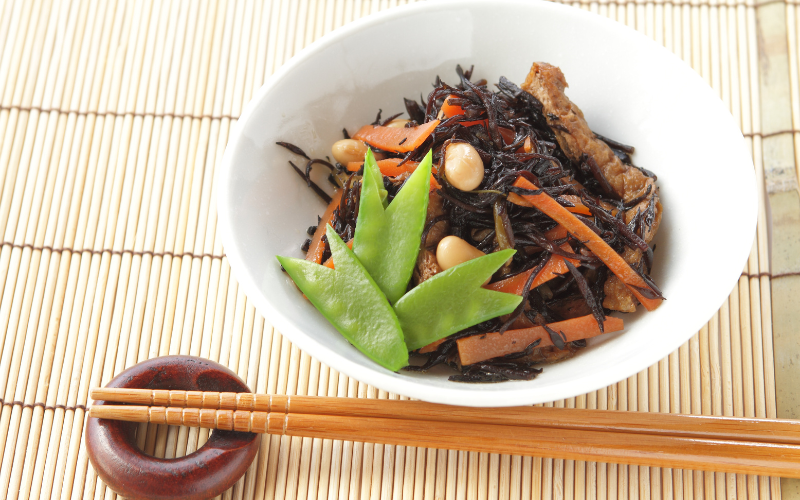
The health benefits of fucoidan
Fucoidan is increasingly recognized for its multiple health benefits. This unique polysaccharide acts as a valuable ally for those looking to improve their overall well-being through a Natural and balanced diet.
Immune system support
Fucoidan is known for its ability to strengthen our immune system, acting as a natural shield against various pathogens. This polysaccharide stimulates the body's natural defenses, helping to prevent infections and improve the overall immune response. By incorporating these algae into your diet, you provide your body with the means to effectively defend itself against diseases.
Several scientific studies support the potential of fucoidan. For example, research published in International Immunopharmacology demonstrated the immunomodulatory effects of fucoidan, indicating that it can enhance the activity of natural killer (NK) cells, which are essential for eliminating infected and tumor cells. These results suggest that fucoidan could be a valuable ally in maintaining a robust immune system.
By regularly consuming brown algae rich in fucoidan, you can not only improve your immunity but also contribute to better overall health. This fits perfectly into a healthy nutrition approach and a balanced lifestyle, where diet plays a key role in maintaining well-being.
Promising anti-cancer potential
Fucoidan is at the heart of numerous oncology research studies. Current studies are exploring its anti-cancer potential, and preliminary results are encouraging. This compound has shown the ability to inhibit the growth of cancer cells in various types of cancers, including those of the breast, colon, and the liver.
Among the mechanisms studied, fucoidan appears to induce theapoptosis, a natural process of programmed cell death that allows the body to eliminate damaged or abnormal cells. Furthermore, it could also inhibit theangiogenesis, the process by which tumors develop new blood vessels to nourish themselves, thereby slowing their progression. A study published in International Journal of Biological Macromolecules highlighted these effects, emphasizing the potential interest of fucoidan as a supplement in the context of integrative anticancer strategies.
However, it is crucial to note that research on fucoidan is still ongoing, and although the results are promising, they should be interpreted with caution. The efficacy and safety of fucoidan as an anticancer agent require further clinical trials to be fully validated. It is essential to consult a healthcare professional before incorporating fucoidan supplements into a cancer treatment protocol..
By adopting a dietary approach that includes fucoidan, it is possible to add a preventive and complementary dimension to one's lifestyle while continuing to follow recommended medical treatments. Incorporating brown seaweed into the daily diet is a natural and tasty way to enjoy the potential benefits of this polysaccharide while enriching one's diet.
Cardiovascular health and fucoidan
Fucoidan offers significant benefits for cardiovascular health. Studies have shown that this polysaccharide can help improve blood circulation and support a healthy heart. Thanks to its anticoagulant properties, fucoidan promotes better blood fluidity, which can reduce the risk of blood clot formation. This action is crucial for preventing cardiovascular diseases, such as heart attacks and strokes.
Furthermore, fucoidan is known for its ability to positively influence cholesterol levels. It helps to lower the level of "bad" LDL cholesterol while increasing the level of "good" HDL cholesterol, thus helping to maintain healthy lipid levels in the blood. This regulation is essential to limit the accumulation of plaques in the arteries, which can lead to cardiac complications.
To make the most of these benefits, it is recommended to regularly incorporate brown algae into your diet. Here are some practical tips:
- In salad : Add rehydrated wakame leaves to your raw salads for a nutritious boost and a delicious texture.
- Infusion : Use pieces of kombu infused in water to prepare smoothies or energy drinks, allowing nutrients to be released without heat.
- Sprinkling : Finely chop some dulse or nori and sprinkle them on your dishes to add an umami flavor and a dose of fucoidan.
By adopting these simple habits, you can not only enjoy delicious meals but also actively support your cardiovascular health through natural and beneficial food choices.

How to incorporate fucoidan into your diet
Incorporating fucoidan into your diet does not require drastic changes and can be done in a simple and tasty way through brown seaweed. These are excellent sources of this beneficial polysaccharide, known for its antioxidant and anti-inflammatory properties. To maximize the benefits, it is recommended to consume these seaweeds fresh or minimally processed to preserve their nutritional richness.
Simple and delicious recipes
Here are some ideas for raw recipes which will allow you to enjoy the benefits of these superfoods while delighting your taste buds. These dishes are easy to prepare and require no cooking, thus adhering to the principles of a living food and vegan.
Wakame and avocado salad
- Rehydrate the Wakame by soaking it in cold water for a few minutes.
- Drain, then mix with slices oflawyer and diced cucumbers.
- Add a touch of lemon juice for acidity.
- Sprinkle with sesame seeds for extra crunch.
- Season with a dash of raw soy sauce to enhance the flavors.
Green smoothie with kombu
- Infuse a few pieces of Kombu in water overnight.
- Remove the kombu in the morning.
- Mix the infused water with fresh spinach, a ripe banana, and a handful of spirulina.
- Savor this revitalizing smoothie for a real morning boost.
Vegetable nori rolls
- Place a nori sheet on a flat surface.
- Garnish with raw vegetables such as grated carrots, julienned peppers, and sprouts of radish.
- Roll firmly and cut into small bites.
- Serve with a sauce made from raw tamari and Ginger.
Dulse chips
- Arrange the pieces of dulse on a plate.
- Lightly sprinkle with sea salt.
- Let it air dry or use a dehydrator.
- Enjoy these healthy chips at any time of the day.
By incorporating these simple and delicious recipes into your routine, you will benefit from the multiple virtues of fucoidan while exploring new flavors. To discover more inspiring ideas, feel free to check out our section dedicated to algae on our site, as well as our two dedicated books and recipe books:
- Cooking with seaweed at Marie Claire Publishing
- Seaweed in everyday life at Gallimard Publishing
Precautions and recommended dosage
When it comes to consuming brown algae rich in fucoidan, it is essential to do it in moderation and with certain precautions in mind to gain the best benefits while avoiding adverse effects. Although these algae are an incredible source of nutrients, their high concentration of iodine and other minerals requires measured consumption, especially for certain populations.
Recommended dosage
For most adults, a serving of 5 to 10 grams consuming dry seaweed per day is generally considered safe and beneficial. This corresponds approximately to a small handful of rehydrated seaweed. However, It is important to start with small amounts, especially if you are not used to consuming seaweed, and gradually increase to allow your body to adjust.
Groups of people who need to be vigilant
Some people should exercise caution when consuming brown algae:
- People having thyroid disorders Due to their high iodine content, seaweeds can influence thyroid function. People suffering from hyperthyroidism or hypothyroidism should consult a healthcare professional before incorporating these foods into their diet.
- Pregnant or breastfeeding women : Although seaweed offers many nutritional benefits, it is advisable to discuss with a doctor to determine the appropriate amount to consume during the pregnancy and thebreastfeeding.
- People on anticoagulant treatment Fucoidan has anticoagulant properties that can interfere with certain medications. It is therefore recommended to consult a healthcare professional before increasing its consumption.
Tips for safe consumption
To safely and effectively incorporate brown algae:
- Vary the types of algae By diversifying the seaweeds consumed (wakame, kombu, nori, dulse), you will benefit from a wider range of nutrients while avoiding an overload of a particular element, such as iodine.
- Check the labels : Ensure that the seaweed you purchase comes from clean sources and is certified organic to avoid contaminants.
- Consult a professional : In case of doubt about the quantity or form of algae to consume, a nutritionist or a naturopath can guide you according to your individual needs.
By observing these precautions and adhering to the recommended dosages, you can safely incorporate fucoidan-rich brown algae into your diet, thereby enriching it in a tasty and nutritious way.

Conclusion
Incorporating brown seaweed rich in fucoidan into your diet is not just about adding a new flavor to your dishes; it's a step towards improved health. This unique polysaccharide, found in marine treasures like wakame and kombu, offers considerable health benefits, ranging from strengthening the immune system to cardiovascular protection. By exploring these dietary options, you open yourself to an exceptional source of nutrition that can contribute to increased longevity and overall well-being.
Incorporating these superfoods into your daily routine will not only allow you to enjoy a variety of delicious dishes but also actively support your health through a vibrant and balanced diet. For those who wish to deepen their knowledge of raw food and discover other superfoods, we invite you to subscribe to our newsletter. Stay informed and inspired to live fully in harmony with nature and vitality.
Your questions and our answers (FAQ)
What is fucoidan and why is it beneficial for health?
Fucoidan is a sulfated polysaccharide found in brown algae such as wakame and kombu. It is known for its antioxidant and anti-inflammatory properties, which help protect cells against free radicals and reduce chronic inflammation. These characteristics contribute to a stronger immune system and may reduce the risk of chronic diseases.
Which brown algae are the best sources of fucoidan?
The best sources of fucoidan are brown seaweeds such as wakame and kombu. Nori and dulse, although they contain less fucoidan, also provide interesting nutritional benefits. These seaweeds can be easily incorporated into the daily diet to enjoy their benefits.
How does fucoidan contribute to longevity, as observed in Okinawa?
In Okinawa, where longevity is particularly high, the inhabitants regularly consume brown algae rich in fucoidan. This polysaccharide contributes to cardiovascular health and the regulation of the immune system, two essential factors for a long and healthy life. A diet rich in fucoidan could partly explain the exceptional longevity of the Okinawans.
How can I incorporate fucoidan-rich brown algae into my daily diet?
You can incorporate wakame into salads, kombu into broths, and use nori for vegetable rolls. For raw options, rehydrate the seaweed or use it in infusions for drinks. These methods allow you to enjoy the benefits of fucoidan in a simple and tasty way.
Are there any precautions to take when consuming brown seaweed?
Yes, due to their high iodine content, it is important to consume brown seaweed in moderation, especially for people with thyroid disorders or those taking anticoagulant medications. It is advisable to start with small amounts and consult a healthcare professional if you are pregnant or breastfeeding.
Does fucoidan have anti-cancer potential?
Fucoidan is the subject of promising research for its anti-cancer properties. It may inhibit the growth of cancer cells and stimulate apoptosis, although more studies are needed to confirm these effects. It is important to consult a healthcare professional before using fucoidan supplements for medical purposes.
What is the recommended daily dose of fucoidan through the consumption of brown seaweed?
A daily dose of 5 to 10 grams of dried seaweed, which corresponds to a small handful of rehydrated seaweed, is generally considered safe for most adults. It is recommended to vary the types of seaweed consumed to benefit from a wide range of nutrients.




